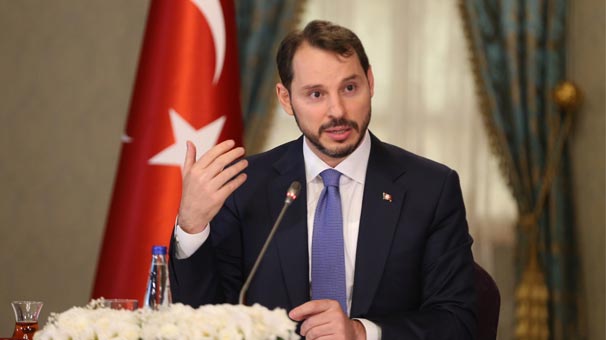Turkey does not expect a big risk to its economy or financial system, Finance Minister Berat Albayrak was quoted on Wednesday as saying, in comments that illustrate a deep divide between Ankara and global investors over a worsening currency crisis.
Albayrak, who is President Tayyip Erdogan’s son-in-law, spoke as ratings agency Moody’s sounded more alarm about the outlook for Turkey’s banking sector and as data showed economic confidence at its lowest in nearly a decade.
The lira has lost around 40 percent of its value this year, driving up the cost of fuel and food and heightening concern about the risk to banks and the broader economy. Initially sparked by worries about Erdogan’s influence on the central bank, the crisis has worsened over a rift with Washington.
“We do not see a big risk about Turkey’s economy or financial system,” Albayrak told reporters on his flight back from Paris earlier this week, according to the newspaper Hurriyet. He cited low levels of net public and household debt, and the strength of the financial system, as reasons for his confidence, it said.
Investors are less sanguine. Albayrak’s comments could bolster a perception that there is “denial within the Turkish government”, said Sebastien Barbe of Credit Agricole.
Albayrak, who is President Tayyip Erdogan’s son-in-law, spoke as ratings agency Moody’s sounded more alarm about the outlook for Turkey’s banking sector and as data showed economic confidence at its lowest in nearly a decade.
The lira has lost around 40 percent of its value this year, driving up the cost of fuel and food and heightening concern about the risk to banks and the broader economy. Initially sparked by worries about Erdogan’s influence on the central bank, the crisis has worsened over a rift with Washington.
“We do not see a big risk about Turkey’s economy or financial system,” Albayrak told reporters on his flight back from Paris earlier this week, according to the newspaper Hurriyet. He cited low levels of net public and household debt, and the strength of the financial system, as reasons for his confidence, it said.
Investors are less sanguine. Albayrak’s comments could bolster a perception that there is “denial within the Turkish government”, said Sebastien Barbe of Credit Agricole.
“It is the same when Erdogan said the central bank should lower interest rates… This is the same kind of spirit and fuels the idea among the investor community that there is a difficulty in terms of macro-management for Turkey,” he said.
Moody’s downgraded its ratings on 20 financial institutions on Tuesday, citing the increased risk of a deterioration in funding. The operating environment is now worse than previously expected, it said.
It cut the ratings for some of Turkey’s top banks, including Isbank (ISCTR.IS), the biggest listed lender by assets.
The lira TRYTOM=D3 weakened as far as 6.49, its weakest since Aug. 15. It was at 6.43 to the dollar at 1523. Banking stocks .XBANK fell 1 percent, while Turkish dollar bonds fell and the cost of insuring its debt rose.
“DEEP DOWNTURN”
“The latest signs show that higher inflation, coupled with a severe tightening of financial conditions, is filtering through into an abrupt slowdown in economic growth,” said Jason Tuvey of Capital Economics in a note to clients.
“There’s no getting away from the fact that the Turkish economy is experiencing a deep downturn.”
Around $179 billion of Turkey’s external debt matures in the year to July 2019, equivalent to almost a quarter of its annual economic output, JPMorgan estimates. Most of that – around $146 billion – is owed by the private sector, especially banks, it said.
For years Turkish companies have borrowed in dollars and euros, drawn by the lower interest rates. But the decline in the lira has driven up the cost of servicing those loans, and raised the possibility of ballooning bad debt for banks.
Official data on Wednesday showed economic confidence fell this month to its lowest since 2009.
In separate comments on Wednesday, Albayrak said the government would take more responsibility in the fight against inflation and would support monetary policies with fiscal measures. He said next year would be a “strong year” in the battle with inflation.
Such optimism has failed to excite investors, who have been more preoccupied with Erdogan’s sway over the central bank. The president, a self-described “enemy of interest rates”, wants to see borrowing costs lowered to keep credit flowing to the construction industry.
MENDING TIES
Albayrak has signaled that Turkey wants to mend its ties with the European Union in the face of U.S. moves that he said threaten the global economy. His trip to Paris this week, where he met France’s finance minister, appeared to be part of that effort.
Albayrak said he would probably visit Britain next week and Germany the week after.
However, Ankara has so far found little help from overseas partners, apart from Qatar, which has pledged $15 billion in support. A German official on Tuesday denied a report that Berlin was considering providing a financial lifeline to help Turkey weather its crisis.
The Hurriyet daily also quoted Albayrak as saying that steps would be taken to prevent foreign currencies from being used for real estate and shopping-mall store rents and sales.
Retailers in Turkey’s malls, which often pay their rent in dollars, have also said their businesses were suffering due to the ailing lira.
Separately, the central bank said it would re-impose limits on overnight transactions, but at twice the limit that applied until Aug. 13, when it said it would provide all the liquidity needed.


